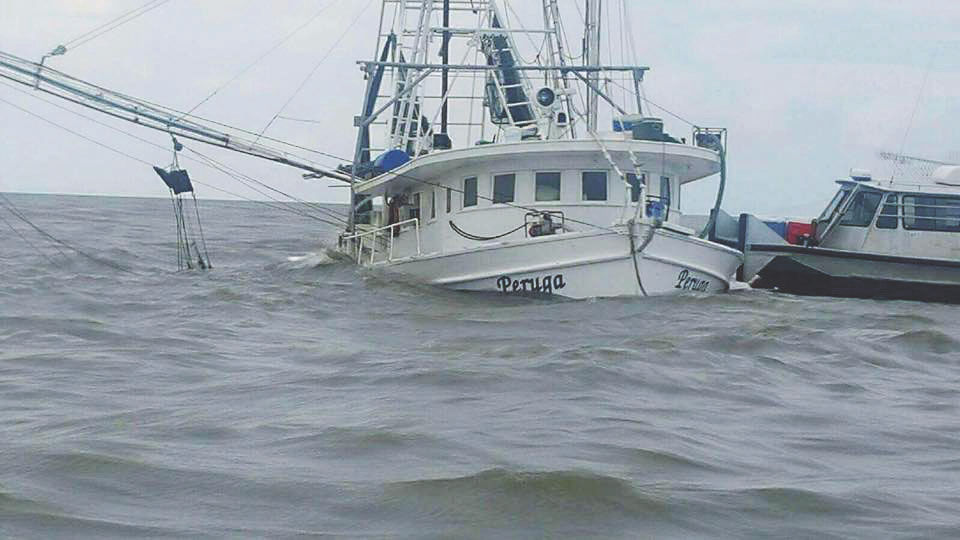Inmate work release hit by slowing economy
June 28, 2016
Houma residents arrested in connection with Slidell man’s disappearance and death
June 30, 2016Coast Guard officials say they operated within their proper protocols during their response to a sinking shrimp boat whose captain was aided by another mariner earlier this month. But the stricken vessel’s captain and other fishermen question that assertion, and say the episode has eroded their confidence in the agency’s rescue capabilities.
No injuries were reported in connection with the sinking of the fishing vessel Peruga, a 60-foot Louisiana shrimp boat that calls St. Bernard Parish home, but travels through Terrebonne and Lafourche waters, as well as those further east into Mississippi. Well-known to local fishermen, the Peruga’s captain is George Barisich, president of the United Commercial Fishermen’s Association, who has for decades advocated on behalf of fishermen.
“It was my belief before the incident that we had to fend for ourselves 99 percent of the time,” Barisich said. “Now it is my knowledge that you’ve got to take care of yourself, that fishermen have to fend for themselves and don’t count on the Coast Guard. Even though we help them all the time and they count on us, don’t count on them.”
A Coast Guard spokeswoman, Alexandria Preston, offered a different view, and said the agency’s members are committed as ever to protecting life and property on the water.
“One of the Coast Guard’s primary missions is to provide search and rescue to mariners who are in distress,” Preston said. “Anytime a person finds themselves in distress, they are encouraged to contact the Coast Guard through VHF-FM radio channel 16 or call their local Coast Guard unit so assistance can be provided when needed.”
Sources within the agency have said the incident will likely be reviewed for determinations of how to prevent communications glitches – and perceptions of non response – in the future.
Problems began around sunset June 17, a Friday, as Barisich was headed southwest from Mississippi waters with 4,000 pounds of shrimp in his hold, on the waters of Lake Borgne.
From the radio in his wheelhouse, Barisich heard the special marine warning of rough seas and heavy winds to come, broadcast by the Coast Guard’s sector station in Mobile, Ala. But he was not near a place where he could find shelter, and so continued on, hoping to cheat the worst of the weather.
At around 8:30 p.m., Barisich noticed a problem with engine temperature, and went below deck to investigate.
He found that the belt that runs the engine’s circulating pump in his engine blew off. He immediately had his two crew members drop anchor, and shut down his motor, attempting a repair as rapidly as possible.
Winds topping 60 mph wailed and whined, throwing the seas into a frenzy.
“There was no way to continue running with the storm, so we shut down,” Barisich said, noting that the boat began taking a heavy beating from waves slamming into the starboard, or right-hand side of the vessel.
“I got it fixed,” Barisich said. “We got the engine cooled but we were drifting with our anchor keeping us side-sea.”
The boat’s outriggers – the tall booms that are a trawler’s trademark – were extended from both sides, giving additional stability.
Seas were about five or six feet high, and Barisich was anxious to get underway again.
As the crew raised the anchor, the vessel pitched to the right, plunging that side’s outrigger into the waves. When it rose again there was a strong jerk, and the dog – a heavy metal part of the assembly for trawling attached to rope and chain – swung against the trawldoor, a heavy piece of wood that aids in keeping the nets down below the surface.
As weather raged, Barisich tried to move the vessel forward but could not gain propulsion. Batted about by the seas and the winds, the Peruga was in trouble.
Reckoning that the nets had gotten caught in the propeller due to the dog-anddoor problem, Barisich radioed a good friend, Frankie Parker, who was anchored in waters about 10 miles away, outside of Grand Pass.
“I said I am coming to get you and tow you to where it is calm,” Parker recalled. “We picked up and started running.”
The Fair Maiden loped through the seas at a speed of about 6 knots.
On board the Peruga, Barisich continued trying to move, frustrated and frightened but trying to keep his captain-cool. At one point he decided to go below deck, to see if he could free the propeller.
“When I went down the stairs, water was over my boot,” Barisich said, describing his realization that the vessel was sinking, likely from a hole related to the dog and trawl door incident. He sprinted back to the wheelhouse, and issued a Mayday alert. The Mayday was relayed by radio from Parker to watch-standers at Mobile.
About 15 minutes had elapsed from when Parker first set out to help and the Mayday message.
“That’s when I stepped it up,” said Parker, who figured it would take him about 45 minutes to reach the stricken vessel. The Coast Guard asked Parker if he had pumps on board but he did not.
An alert to mariners – an urgent message intended to route help to a vessel in trouble – went out over the air. According to Parker, the alert was repeated about every 15 or 20 minutes, although the Coast Guard account did not state the frequency.
Barisich, meanwhile, communicated with watch-standers, asking them for aid.
“He asked me, ‘Are you in danger’, and I said if you send me a pump I won’t be, but if you don’t all three of us may drown.”
Asked if he was in imminent peril, Barisich said he was not. Life jackets had been donned; electronic equipment had been evacuated from the wheelhouse.
While not knowing when the Fair Maiden would arrive, Barisich knew help was coming.
Both Parker and Barisich were distressed by a question the watch-stander at Mobile asked, which was whether they had called SeaTow, the mariner’s version of AAA.
“That’s his job; I called him,” Barisich later said. “I told him I am not broke down, I am sinking.”
Sector Mobile, nonetheless, was treating the case as a distress call. Its search and- rescue coordinator, according to the Coast Guard summary provided to The Times, had checked with Coast Guard Station New Orleans to see if a helicopter could be sent.
“Air Station New Orleans was unable to launch the helicopter due to the inclement weather that was surpassing the helicopter’s mission capabilities,” the summary states.
Both Barisich and Parker agreed that during at least part of the ordeal, some of the rougher weather may have reached New Orleans.
Coast Guard helicopters will fly in extreme weather, but avoid the skies when there is risk of a lightning strike, personnel told The Times.
Station Gulfport, according to the Coast Guard summary, did send a response boat to aid the Peruga. The summary, however, does not state what time that boat was dispatched. What is known is that any of the response boats at Gulfport can reach speeds four to five times faster than Parker’s shrimp boat.
As Parker headed to Barisich the seas calmed and the winds lay down, though conditions were still not optimal. Upon reaching the Peruga, Parker threw a line from his stern to Barisich, who tied it onto his vessel. With the sinking Peruga under tow, Parker traveled to Turkey Bayou, a place where he knew he could ground the vessel, thus eliminating the sinking risk.
The Coast Guard response boat, the account given by the agency states, “returned to base when the response boat crew was informed that the Fair Maiden took the Peruga in tow and then ran the Peruga aground in Turkey Bayou in an effort to keep the vessel from sinking.”
“The water depth in Turkey Bayou where the Peruga was located was too shallow for the response boat to enter,” the narrative also states. “After the Peruga was grounded, the Fair Maiden was on scene and willing to assist the captain of the Peruga and evacuate him if necessary. Sector Mobile determined the situation to be a salvage case when the vessel was grounded and the captain had an available resource nearby to get him to safety.”
At the point when Parker reached the Peruga, it was between eight and ten inches of being “completely submerged.”
With the Peruga safe from sinking at Turkey Bayou, Barisich tried to pump out.
“I stayed with him all night,” Parker said. “I had a little pump and there was one from another boat.”
What pumps were on hand could not do the job. By the next morning other fishermen showed up, utilizing pumps they had on board.
But there were still challenges.
The Peruga was intentionally grounded at low tide; by morning, the tide had come up considerably, making the pumping operation more intensive.
By Monday, June 20, the Peruga was pumped out as well as it could be and underwent some patchwork.
Barisich was towed to a dock where the real work of restoring the vessel could begin. His 4,000 pounds of shrimp were returned to Neptune. Once out of danger, Barisich sent photos of the Peruga ordeal to friends, who posted them on Facebook and other social media.
By word of mouth, dissatisfaction with the Coast Guard response has been gaining
traction.
The question not yet answered to Barisich’s satisfaction is why a Coast Guard boat capable of traveling 40 knots was not immediately dispatched to the distress call, and no answers have yet surfaced.
“My concern is that if another event happens like this with me or anybody else, someone may die because they can’t bring a pump,” Barisich said, expressing his gratitude that Parker was able to help. He is also grateful to his deckhands, Andre
Usea and Ben “Pickle” – whose last name he does not know. “They were taking orders like champions.” •












